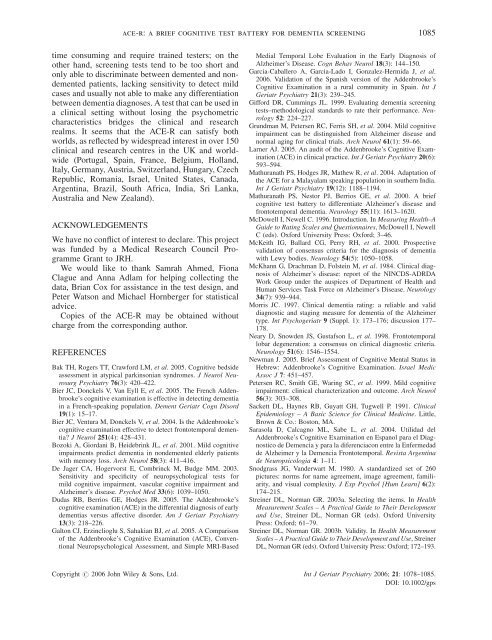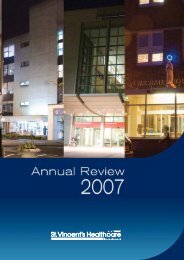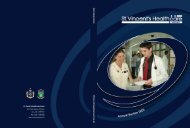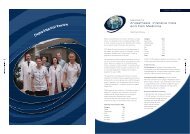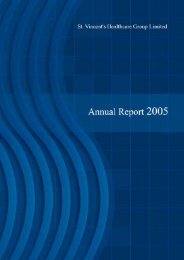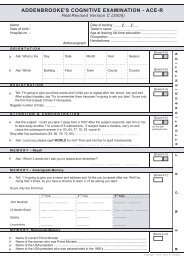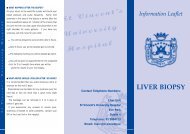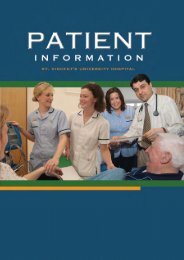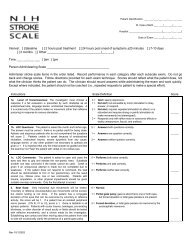The Addenbrooke's Cognitive Examination Revised (ACE-R): a brief ...
The Addenbrooke's Cognitive Examination Revised (ACE-R): a brief ...
The Addenbrooke's Cognitive Examination Revised (ACE-R): a brief ...
Create successful ePaper yourself
Turn your PDF publications into a flip-book with our unique Google optimized e-Paper software.
ace-r: a <strong>brief</strong> cognitive test battery for dementia screening 1085<br />
time consuming and require trained testers; on the<br />
other hand, screening tests tend to be too short and<br />
only able to discriminate between demented and nondemented<br />
patients, lacking sensitivity to detect mild<br />
cases and usually not able to make any differentiation<br />
between dementia diagnoses. A test that can be used in<br />
a clinical setting without losing the psychometric<br />
characteristics bridges the clinical and research<br />
realms. It seems that the <strong>ACE</strong>-R can satisfy both<br />
worlds, as reflected by widespread interest in over 150<br />
clinical and research centres in the UK and worldwide<br />
(Portugal, Spain, France, Belgium, Holland,<br />
Italy, Germany, Austria, Switzerland, Hungary, Czech<br />
Republic, Romania, Israel, United States, Canada,<br />
Argentina, Brazil, South Africa, India, Sri Lanka,<br />
Australia and New Zealand).<br />
ACKNOWLEDGEMENTS<br />
We have no conflict of interest to declare. This project<br />
was funded by a Medical Research Council Programme<br />
Grant to JRH.<br />
We would like to thank Samrah Ahmed, Fiona<br />
Clague and Anna Adlam for helping collecting the<br />
data, Brian Cox for assistance in the test design, and<br />
Peter Watson and Michael Hornberger for statistical<br />
advice.<br />
Copies of the <strong>ACE</strong>-R may be obtained without<br />
charge from the corresponding author.<br />
REFERENCES<br />
Bak TH, Rogers TT, Crawford LM, et al. 2005. <strong>Cognitive</strong> bedside<br />
assessment in atypical parkinsonian syndromes. J Neurol Neurosurg<br />
Psychiatry 76(3): 420–422.<br />
Bier JC, Donckels V, Van Eyll E, et al. 2005. <strong>The</strong> French Addenbrooke’s<br />
cognitive examination is effective in detecting dementia<br />
in a French-speaking population. Dement Geriatr Cogn Disord<br />
19(1): 15–17.<br />
Bier JC, Ventura M, Donckels V, et al. 2004. Is the Addenbrooke’s<br />
cognitive examination effective to detect frontotemporal dementia?<br />
J Neurol 251(4): 428–431.<br />
Bozoki A, Giordani B, Heidebrink JL, et al. 2001. Mild cognitive<br />
impairments predict dementia in nondemented elderly patients<br />
with memory loss. Arch Neurol 58(3): 411–416.<br />
De Jager CA, Hogervorst E, Combrinck M, Budge MM. 2003.<br />
Sensitivity and specificity of neuropsychological tests for<br />
mild cognitive impairment, vascular cognitive impairment and<br />
Alzheimer’s disease. Psychol Med 33(6): 1039–1050.<br />
Dudas RB, Berrios GE, Hodges JR. 2005. <strong>The</strong> Addenbrooke’s<br />
cognitive examination (<strong>ACE</strong>) in the differential diagnosis of early<br />
dementias versus affective disorder. Am J Geriatr Psychiatry<br />
13(3): 218–226.<br />
Galton CJ, Erzinclioglu S, Sahakian BJ, et al. 2005. A Comparison<br />
of the Addenbrooke’s <strong>Cognitive</strong> <strong>Examination</strong> (<strong>ACE</strong>), Conventional<br />
Neuropsychological Assessment, and Simple MRI-Based<br />
Medial Temporal Lobe Evaluation in the Early Diagnosis of<br />
Alzheimer’s Disease. Cogn Behav Neurol 18(3): 144–150.<br />
Garcia-Caballero A, Garcia-Lado I, Gonzalez-Hermida J, et al.<br />
2006. Validation of the Spanish version of the Addenbrooke’s<br />
<strong>Cognitive</strong> <strong>Examination</strong> in a rural community in Spain. Int J<br />
Geriatr Psychiatry 21(3): 239–245.<br />
Gifford DR, Cummings JL. 1999. Evaluating dementia screening<br />
tests–methodological standards to rate their performance. Neurology<br />
52: 224–227.<br />
Grundman M, Petersen RC, Ferris SH, et al. 2004. Mild cognitive<br />
impairment can be distinguished from Alzheimer disease and<br />
normal aging for clinical trials. Arch Neurol 61(1): 59–66.<br />
Larner AJ. 2005. An audit of the Addenbrooke’s <strong>Cognitive</strong> <strong>Examination</strong><br />
(<strong>ACE</strong>) in clinical practice. Int J Geriatr Psychiatry 20(6):<br />
593–594.<br />
Mathuranath PS, Hodges JR, Mathew R, et al. 2004. Adaptation of<br />
the <strong>ACE</strong> for a Malayalam speaking population in southern India.<br />
Int J Geriatr Psychiatry 19(12): 1188–1194.<br />
Mathuranath PS, Nestor PJ, Berrios GE, et al. 2000. A <strong>brief</strong><br />
cognitive test battery to differentiate Alzheimer’s disease and<br />
frontotemporal dementia. Neurology 55(11): 1613–1620.<br />
McDowell I, Newell C. 1996. Introduction. In Measuring Health–A<br />
Guide to Rating Scales and Questionnaires, McDowell I, Newell<br />
C (eds). Oxford University Press: Oxford; 3–46.<br />
McKeith IG, Ballard CG, Perry RH, et al. 2000. Prospective<br />
validation of consensus criteria for the diagnosis of dementia<br />
with Lewy bodies. Neurology 54(5): 1050–1058.<br />
McKhann G, Drachman D, Folstein M, et al. 1984. Clinical diagnosis<br />
of Alzheimer’s disease: report of the NINCDS-ADRDA<br />
Work Group under the auspices of Department of Health and<br />
Human Services Task Force on Alzheimer’s Disease. Neurology<br />
34(7): 939–944.<br />
Morris JC. 1997. Clinical dementia rating: a reliable and valid<br />
diagnostic and staging measure for dementia of the Alzheimer<br />
type. Int Psychogeriatr 9 (Suppl. 1): 173–176; discussion 177–<br />
178.<br />
Neary D, Snowden JS, Gustafson L, et al. 1998. Frontotemporal<br />
lobar degeneration: a consensus on clinical diagnostic criteria.<br />
Neurology 51(6): 1546–1554.<br />
Newman J. 2005. Brief Assessment of <strong>Cognitive</strong> Mental Status in<br />
Hebrew: Addenbrooke’s <strong>Cognitive</strong> <strong>Examination</strong>. Israel Medic<br />
Assoc J 7: 451–457.<br />
Petersen RC, Smith GE, Waring SC, et al. 1999. Mild cognitive<br />
impairment: clinical characterization and outcome. Arch Neurol<br />
56(3): 303–308.<br />
Sackett DL, Haynes RB, Guyatt GH, Tugwell P. 1991. Clinical<br />
Epidemiology – A Basic Science for Clinical Medicine. Little,<br />
Brown & Co.: Boston, MA.<br />
Sarasola D, Calcagno ML, Sabe L, et al. 2004. Utilidad del<br />
Addenbrooke’s <strong>Cognitive</strong> <strong>Examination</strong> en Espanol para el Diagnostico<br />
de Demencia y para la diferenciacon entre la Enfermedad<br />
de Alzheimer y la Demencia Frontotemporal. Revista Argentina<br />
de Neuropsicologia 4: 1–11.<br />
Snodgrass JG, Vanderwart M. 1980. A standardized set of 260<br />
pictures: norms for name agreement, image agreement, familiarity,<br />
and visual complexity. J Exp Psychol [Hum Learn] 6(2):<br />
174–215.<br />
Streiner DL, Norman GR. 2003a. Selecting the items. In Health<br />
Measurement Scales – A Practical Guide to <strong>The</strong>ir Development<br />
and Use, Streiner DL, Norman GR (eds). Oxford University<br />
Press: Oxford; 61–79.<br />
Streiner DL, Norman GR. 2003b. Validity. In Health Measurement<br />
Scales – A Practical Guide to <strong>The</strong>ir Development and Use,Streiner<br />
DL, Norman GR (eds). Oxford University Press: Oxford; 172–193.<br />
Copyright # 2006 John Wiley & Sons, Ltd. Int J Geriatr Psychiatry 2006; 21: 1078–1085.<br />
DOI: 10.1002/gps


